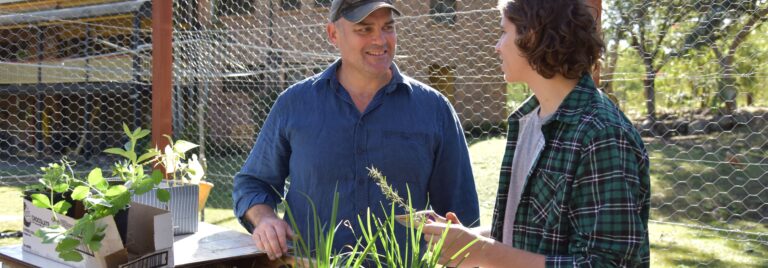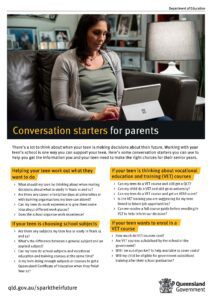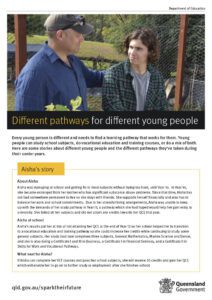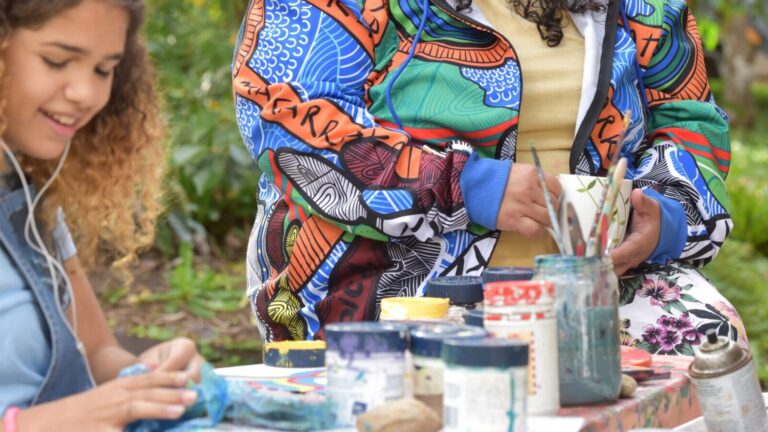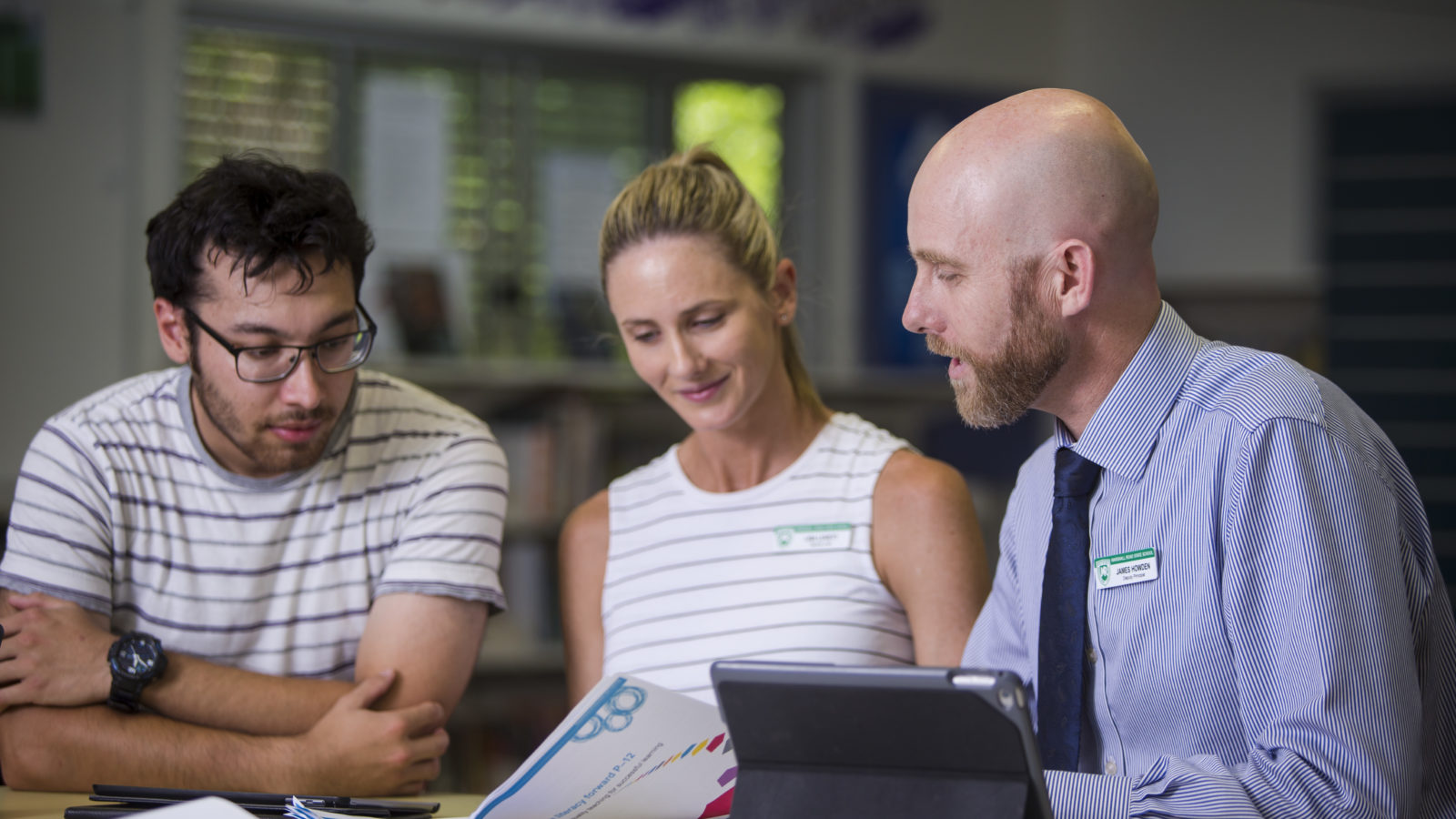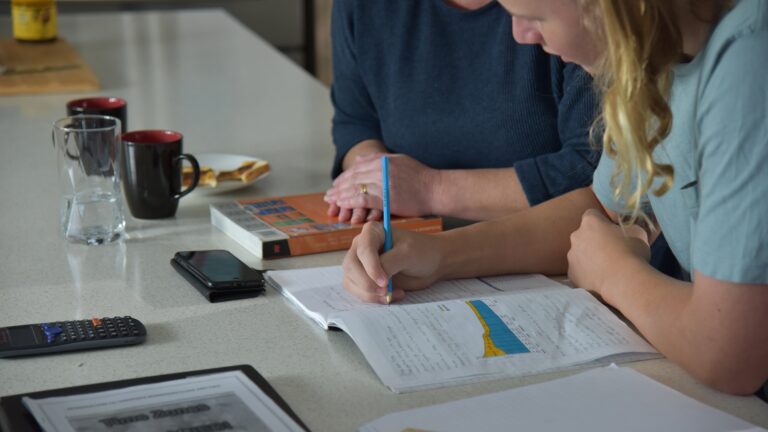Key Points
- Every young person is different and needs to find the learning pathway that works for them.
- Staying at school to the end of Year 12 can improve young people’s chances of going on to further study or finding work after school.
- Young people can study school subjects, do vocational education and training (on-the-job, hands-on learning) or do a mix of both.
- Working with your teen’s school is a great way to support your teen in making good decisions about their future.
Schools offer many interesting subjects and courses to prepare young people for life after school. And there are lots of ways to do the senior years depending on your teen’s interests, career goals, and personal learning style. Talk to your teen’s school to find out what they can offer and work with them to help your teen choose the right options for senior schooling for them.
Which option is right for my teen?
In their senior years, students can work towards a Queensland Certificate of Education (QCE), vocational qualification and/or an Australian Tertiary Admission Rank (ATAR).
- The Queensland Certificate of Education, or QCE as it is known for short, is the qualification Queensland students receive at the end of Year 12 if they complete enough learning.
- An Australian Tertiary Admission Rank (ATAR) is a national system used to rank students who want to get into university.
Vocational education and training qualifications can give your child a direct start on their career pathway as well as count towards a QCE and if they do a Certificate III or above, and ATAR as well. Vocational qualification options include courses available at school if the school is a registered training provider, through other training providers outside the school like a TAFE, or through school-based apprenticeships or traineeships.
School subjects
Students can select from a range of subjects to suit their interests, abilities and career goals. Talk to your teen’s school to help them select the subjects that are best suited to their interests, career goals, and personal situation.
General subjects
General subjects are aimed at students seeking entry to university or vocational education and training, as well as work. Results in general subjects may contribute to an ATAR. Students who study general subjects can:
- earn points towards their Queensland Certificate of Education
- study subjects such as Specialist Mathematics, Economics, Biology, Physics, Music, Geography, and Legal Studies.
For some university courses, students will need to have studied certain general subjects at school (known as prerequisites). Read more about what you need to be admitted to different courses.
Applied subjects
Applied subjects focus on practical skills and prepare students for further education and training, as well as work. Students who study applied subjects at school can:
- earn up to four points per subject towards their Queensland Certificate of Education
- study subjects such as Essential English, Essential Mathematics, Business Studies, Industrial Technology Skills, and Tourism.
Students can study either general and applied subjects or a combination of both. If your teen wants to be eligible for an ATAR, they must do:
- 5 General subjects, or
- 4 General subjects, plus one Applied subject, or
- 4 General subjects, plus one VET qualification at Certificate III or above.
To be eligible for an ATAR, students must successfully complete an English subject. In addition, the following subject combination rules apply:
- Only General English subjects or Applied English subjects can be included in the ATAR, but not both.
- Only General mathematics subjects or Essential Mathematics can be included in the ATAR, but not both.
- If you complete the same Language subject (e.g. Chinese) as both an internally-assessed subject and a Senior External Examination, only one result can be included in your ATAR.
Please talk to your teen’s school to work out the best approach for your child.
Vocational education and training
Students can learn hands-on, workplace skills for many different occupations through studying vocational education and training courses, or VET for short. Students can receive their training at school if their school is registered to deliver the training or from an outside training organisation such as a TAFE.
School-based apprenticeships and traineeships
Teens can start an apprenticeship or traineeship while they are still at school, generally in Years 10, 11 or 12. There are more options than you think with apprenticeships and traineeships available in many industries including aviation, beauty, health, tourism and travel, telecommunications, library and museum services, printing and graphic arts, conservation and land management, business, boating and marine, and real estate and property management. Students who do a school-based apprenticeship and traineeship can:
- study at school and get on-the-job experience while being trained and working towards a qualification in a trade (apprenticeship) or occupation (traineeship)
- be trained in trades like electrical, plumbing, cabinet-making or automotive and industries like business administration, information technology and tourism
- gain skills towards a qualification (Certificate II, III, or higher) recognised wherever they want to work in Australia
- earn points towards the Queensland Certificate of Education that is awarded at the end of Year 12 to students who complete enough learning
- have the chance to build a relationship with a potential employer for when they leave school.
Certificate courses
Students who study a VET course while still at school can:
- earn a qualification from Certificate I up to Certificate III
- study areas such as health, hospitality, horticulture, community services and engineering
- receive their training at school if their school is registered to deliver the training or from an outside training organisation such as a TAFE.
A mix of school subjects and VET
Schools can work with you and your teen to come up with an approach that works for your child. If your teen wants to keep their options open or is unsure about what they want to do when they finish school, doing a mix of school subjects and vocational education and training might be a good option for them. Here are some examples of where students have combined school subjects with a VET course to give you an idea of how this can work, keeping in mind that every student is different and you will need to speak to your teen’s school about what pathways they can offer.
Doing a VET course or working instead of going to school
After your child turns 16 or completes Year 10, whichever comes first, they will need to be learning or earning until they turn 17, gain a qualification, or complete Year 12. This period of schooling is known as the ‘compulsory participation phase’ and during this time, your teen can keep going to school or leave school and learn or earn elsewhere. Talk to their school about your teen’s plans and options so the school principal can make sure your child’s training or employment pathway meets your legal obligation (also known as an ‘eligible option’) until they turn 17. The eligible options they can choose from include:
- enrolling in a vocational education and training course
- getting a job for at least 25 hours per week
- doing an apprenticeship or traineeship
- undertaking a Skilling Queenslanders for Work program to receive training and/or do work placements to help get a job
- a combination of the above.
For some young people these training and employment pathways can help them get a secure footing in the employment destination of their choice and can lead to a lifetime of employment success. But just in case things don’t work out with your teen’s job or training, it’s worth maintaining a positive relationship with your teen’s school, and even getting in touch with them every now and again, so if things don’t work out with your teen’s job or training, they can return to school or seek the school’s help in finding a new pathway.
Alternative learning settings
If your teen is struggling at school and talking about leaving, talk to the school. Schools work hard to meet the needs of all students and there are many ways to engage young people in mainstream schools during their senior years. However, some young people do not thrive in mainstream schools and/or may learn better in different learning environments. Your teen’s school can talk to you about what they can offer to help your teen keep going and make the most of their senior years.
Students with individual learning needs
If your child has a disability or additional learning needs, schools can make adjustments to suit your child’s needs and support them in continuing to learn alongside their friends of the same age. Speak to your child’s school about the kinds of adjustments the school can make to support your teen and also what you and your teen should consider when deciding on the best pathway for your teen in the senior years. For some of you, the Autism Hub and Reading and Writing Centre may be a useful place to gather information to help you support your child’s learning. At the end of Year 12, students on individualised learning programs receive a Queensland Certificate of Individual Achievement (QCIA) which is an official record that students have completed at least 12 years of education and provides a summary of their skills and knowledge they can present to employers and training providers.
Work with your teen’s school
Working with your child’s school can help your teen get the support they need to make decisions about their future. The school guidance officer, along with your teen’s teachers, can help you and your teen. In Year 10, the team at your child’s school will work with you and your teen on their Senior Education and Training Plan (or ‘SET plan’ for short). This process is the ideal time to explore the different options available to your teen during their senior years.
Download the tip sheet: Conversation starters for parents
Download tip sheet: Different pathways for different young people
Last Updated: 22 February 2024

